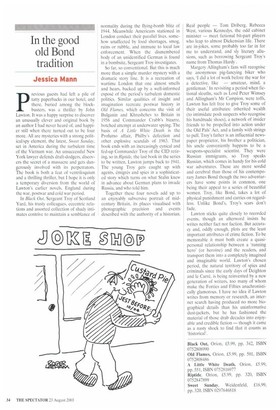In the good old Bond tradition
Jessica Mann
previous guests had left a pile of tatty paperbacks in our hotel, and there, buried among the blockbusters, was a thriller by John Lawton. It was a happy surprise to discover an unusually clever and original book by an author I had never heard of, and happier still when there turned out to be four more. All are mysteries with a strong political/spy element, the latest, Sweet Sunday, set in America during the turbulent time of the Vietnam war. An unsuccessful New York lawyer defends draft-dodgers, discovers the secret of a massacre and gets dangerously involved with its perpetrators. The book is both a feat of ventriloquism and a thrilling thriller, but I hope it is only a temporary diversion from the world of Lawton's earlier novels. England during the war, postwar and cold war period.
In Black Out, Sergeant Troy of Scotland Yard, his trusty colleagues, eccentric relations and assorted collection of shady intimates contrive to maintain a semblance of normality during the flying-bomb blitz of 1944. Meanwhile Americans stationed in London conduct their parallel lives, somehow unaffected by food shortages, smog, ruins or rubble, and immune to local law enforcement. When the dismembered body of an unidentified German is found in a bombsite, Sergeant Troy investigates.
So far, so conventional. But this is much more than a simple murder mystery with a dramatic story line. It is a recreation of wartime London that one almost smells and hears, backed up by a well-informed exposé of the period's turbulent domestic politics. Similar qualities of insight and imagination recreate postwar history in Old Flames, which concerns the visit of Bulganin and Khrushchev to Britain in 1956 and Commander Crabb's bizarre, botched attempt at underwater spying. The basis of A Little White Death is the Profumo affair, Philby's defection and other explosive scandals of 1963. That book ends with an increasingly cynical and fed-up Commander Troy of the CID retiring, so in Riptide, the last book in the series to be written, Lawton jumps back to 1941. The young Troy gets caught up with agents, émigrés and spies in a sophisticated story which turns on what Stalin knew in advance about German plans to invade Russia, and who told him.
Together these four novels add up to an enjoyably subversive portrait of midcentury Britain, its places visualised with photographic precision and events described with the authority of a historian. Real people — Tom Driberg, Rebecca West, various Kennedys, the odd cabinet minister — meet fictional bit-part players who leap to almost Dickensian life. There are in-jokes, some probably too far in for me to understand, and sly literary allusions, such as borrowing Sergeant Troy's name from Thomas Hardy.
Margery Allingham's fans will recognise the anonymous pig-fancying biker who says, `I did a lot of work before the war for a detective, like — amateur, mind, a gentleman.' In revisiting a period when fictional sleuths, such as Lord Peter Wimsey and Allingham's Mr Campion, were toffs, Lawton has felt free to give Troy some of their useful attributes: inherited wealth (to intimidate posh suspects who recognise his handmade shoes), a network of insider friends to be propelled into action under the Old Pals' Act, and a family with strings to pull. Troy's father is an influential newspaper proprietor, his brother a politician, his uncle conveniently happens to be a weapons-specialist scientist. They were Russian immigrants, so Troy speaks Russian, which comes in handy for his cold war adventures. These are more sordid and cerebral than those of his contemporary James Bond though the two adventurers have some points in common, one being their appeal to a series of beautiful women. Troy, like Bond, takes a lot of physical punishment and carries on regardless. Unlike Bond's, Troy's scars don't fade.
Lawton sticks quite closely to recorded events, though an afterword insists he writes neither fact nor faction. But accuracy and, oddly enough, plots are the least important attributes of crime fiction. To be memorable it must both create a quasipersonal relationship between a 'running hero' (or heroine) and the readers, and transport them into a completely imagined and imaginable world. Lawton's chosen period, the natural territory of spies and criminals since the early days of Deighton and le Carre, is being reinvented by a new generation of writers, too many of whom make the Forties and Fifties anachronistically glamorous. I have no idea if Lawton writes from memory or research, an internet search having produced no more biographical details than his uninformative dust-jackets, but he has fashioned the material of those drab decades into enjoyable and credible fiction — though it came as a nasty shock to find that it counts as `historical'.


























































 Previous page
Previous page